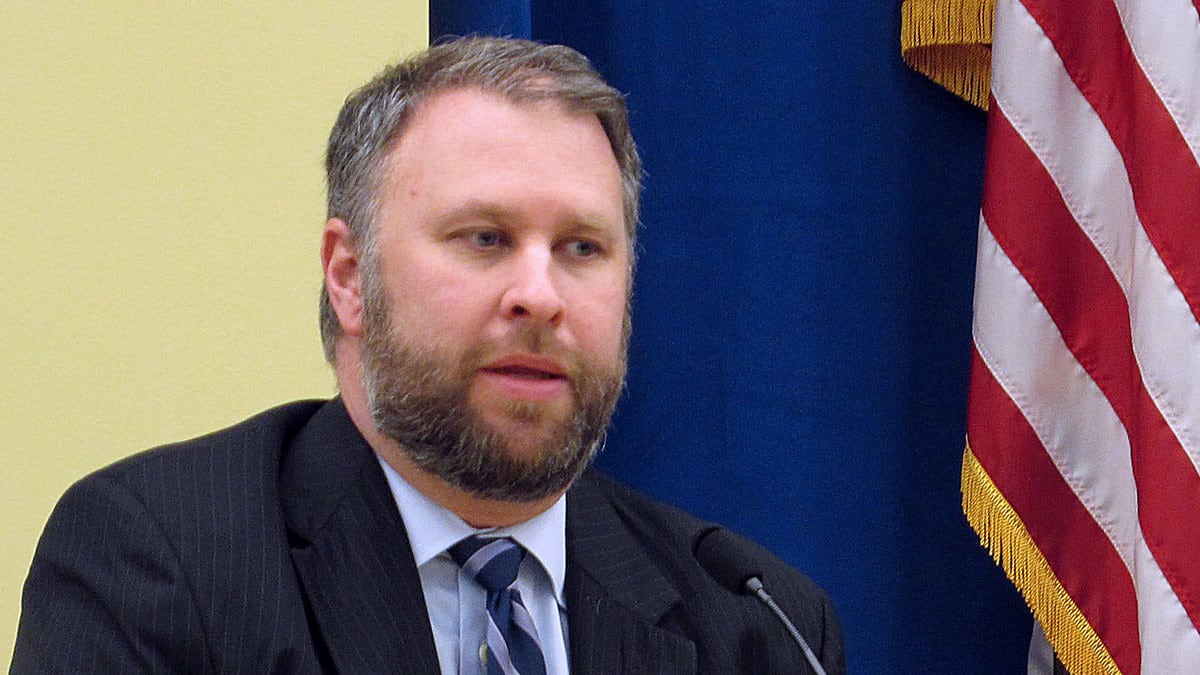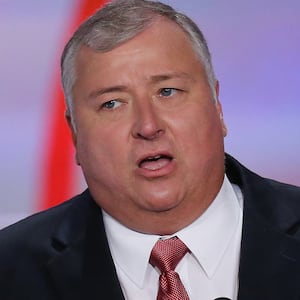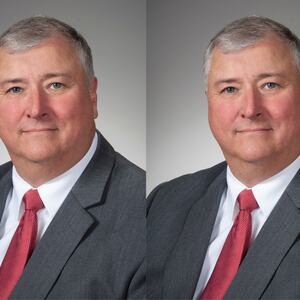In September 2019, Matt Borges, an Ohio lobbyist and former chairman of the state Republican Party, reached out to a canvasser working to collect petition signatures to roll back a massive bailout of Ohio’s nuclear energy industry. According to federal prosecutors, he offered the canvasser $15,000 to be a double agent and provide the opposition with inside information.
The canvasser initially recoiled at the prospect, and immediately after the meeting contacted the FBI. The FBI wired him up and told him to circle back with Borges and accept the offer. According to criminal complaints handed down this week, the canvasser—referred to as Confidential Human Source 1—reconnected with Borges, got that $15,000 payment, and proceeded to provide extensive, damning details to investigators about what the U.S. attorney in Ohio’s Southern District called “likely the largest bribery [and] money-laundering scheme ever perpetrated against the people of the state of Ohio.”
Borges was one of five people arrested Tuesday; another was Larry Householder, the Republican speaker of Ohio’s state house of representatives. Prosecutors accuse them of orchestrating a massive bribery and racketeering scheme to funnel money from Ohio utility FirstEnergy into the pockets of Householder, his allies, and a sprawling network of interest groups, political action committees, and consulting firms. In exchange, the feds say, Householder, Borges, and their co-conspirators spearheaded successful legislative efforts to bail out FirstEnergy’s struggling nuclear-power business to the tune of $1.5 billion.
The allegations have already rocked the Ohio political world. But prosecutors made clear this week that they are not finished with their investigation, and left open the possibility of future arrests. The criminal complaints filed this week are full of references to pseudonymous individuals and organizations involved to some degree in the alleged scheme.
PAY DIRT dug into the details offered in the complaints and cross-referenced them with public records and our own reporting in order to identify as many of the unnamed parties as possible. The picture that emerges is that of a scandal that has the potential to reach far beyond Columbus to political operatives sprawled across the country, and potentially even into the upper echelons of President Donald Trump’s re-election campaign.
We contacted every individual we were able to identify. Few were willing to discuss their alleged ties to Householder’s political machine. Those that did sought to downplay those ties. And while none of those individuals has been accused of wrongdoing, the information presented in the complaint offers a detailed and disturbing look behind the scenes of a sprawling—and, prosecutors say, thoroughly corrupt—effort to consolidate power and reward political benefactors.
It’s clear from the complaints that the FBI’s investigation was well underway by the time Borges allegedly offered to bribe the canvasser in September. At the time, Borges was part of a Householder-led effort, which would eventually succeed, to beat back a ballot initiative that would roll back a recently approved state law to bail out FirstEnergy’s nuclear plants.
Prosecutors say Householder and his allies had already used tens of millions of dollars provided directly by FirstEnergy, and routed through a network of dark-money groups and consulting firms, to get that law passed by the state legislature. Now they were using those funds to combat efforts to get repeal on the ballot in November. And one of their chief tactics for doing so, prosecutors say, was to bribe people hired by the opposition to switch sides.
Once Confidential Human Source 1 was wired up, his meetings with Borges provided information that is central to the criminal charges. In one recorded conversation, Borges referred to an “unholy alliance” between Householder and FirstEnergy. The phrase pops up repeatedly in the prosecutors’ case.
The alleged effort to bribe canvassers was just one aspect of the scheme, and one that occurred late in the process. But it shows just how far outside of Ohio the scandal has the potential to reach.
About three weeks after the FBI wired up CHS 1, agents secured a recording of a dinner party where another defendant in the case, lobbyist and Householder adviser Neil Clark, detailed the efforts to “buy out their people.” After that dinner, prosecutors say, Clark had 45 contacts with someone identified as “Contractor 1, a principal of Petition Signature Services Co 2.”
The complaint does not name either the individual or the company. But it does include screenshots of a text-message conversation between Contractor 1, who identifies herself as “Meghan,” and a potential target of their “buyout” efforts. The phone number in the screenshots is redacted, but as it happens, the same screenshots popped up, unredacted, in a civil lawsuit filed by the anti-bailout side last year.
PAY DIRT called the unredacted number for “Meghan” and reached the voicemail of Meghan Cox, a principal at Lincoln Strategy Group, an Arizona-based grassroots-strategy firm. The complaint says Contractor 1 “markets himself/herself as a leading expert in ballot initiative access and strategy.” Cox’s bio on the Lincoln Strategy Group website says she “is considered a leading expert in ballot initiative access and strategy.” The bio also boasts that she’s worked with prominent Republicans, including Sens. Dan Sullivan, Mike Rounds, and Roy Blunt.
Cox did not respond to requests for comment on the allegations.
According to the complaint, Cox’s efforts to recruit—and pay—opposing canvassers began on the very day that the Lincoln Strategy Group received $600,000 from a company identified solely as “Front Company.” While it’s not named, prosecutors provided one crucial bit of information: Front Company, they said, was incorporated in Ohio on July 30, 2019. That matches up precisely with a group called Ohioans for Energy Security, which ran a host of ads promoting the FirstEnergy bailout, supporting Householder allies in the statehouse, and attacking their political opponents.
The group’s tactics were remarkably underhanded. Under Ohio law, petition signature collectors must file a form with the state identifying themselves. Householder’s allies took those names and ran criminal background checks. When they discovered that roughly one in 10 opposition canvassers had criminal records, they crafted direct-mail pieces, sent under the Ohioans for Energy Security moniker, that attempted to scare people away from responding to signature-gatherers who knocked on their doors by warning that the opposing canvassers could be criminals.
“So fucking cold-blooded,” Clark said of a tactic at that recorded dinner-party conversation in September, according to prosecutors. He also said the mail pieces were designed by Jeff Longstreth, Householder’s top political adviser and another of the people arrested this week.

Larry Householder
Ohio House of RepresentativesOhioans for Energy Security’s involvement in the scheme helps identify two other unnamed parties repeatedly mentioned in the complaints. They’re referred to only as Political Advertising Agency 1 and Media Placement Company 1, but PAY DIRT has been able to identify them as the Strategy Group, a leading Republican consultancy in Ohio, and a sister company called Strategic Media Placement.
Scott Schweitzer, the Strategy Group’s chief operating officer, told PAY DIRT that his company “serve[s] hundreds of campaigns every year as a vendor to clients all across our nation, where we perform media buying, planning, placement, strategy and production as we did for these clients and others.”
According to prosecutors, the institutional hub of the Householder bribery scheme was a dark-money group called Generation Now, through which the co-conspirators laundered nearly $61 million provided by FirstEnergy. Longtime PAY DIRT readers know that we began digging into Generation Now in 2018, and tied the group to Householder and Longstreth last year.
In the course of that reporting, we noticed that Generation Now’s publicly listed address was shared by the Strategy Group. We got on the phone with Rex Elsass, the firm’s founder and CEO. He told us that his company was subletting the office space to Householder. Minutes after we hung up, he called back to correct himself; the tenant was Generation Now, he said, not Householder.
It turns out it was effectively both. According to the complaint, Householder and Longstreth “shared office space, rented from their Political Advertising Agency… Generation Now also paid rent to Political Advertising Agency.”
When the FBI raided Longstreth’s office, it recovered a draft script for a Generation Now television ad promoting House Bill 6, the legislation that bailed out FirstEnergy. According to prosecutors, the script was written on Strategy Group letterhead. When Juan Cespedes, a FirstEnergy lobbyist who was also arrested this week, wanted a rundown of Generation Now’s total advertising spending, he queried Longstreth, who got the number from his contact at the Strategy Group.
In addition to its ad-buying for Generation Now, Strategic Media Placement was also taking out airtime for Ohioans for Energy Security, according to filings with the Federal Communications Commission.
The Strategy Group performed similar services for another spoke in the Householder network, but its role isn’t as immediately clear from FCC filings—or from the complaints. In the final few weeks of the 2018 election cycle, when the Householder network was using FirstEnergy funds to bankroll efforts to elect allies to the statehouse, a group called Hardworking Ohioans Inc. began buying ad time backing those candidates.
The complaint identifies Hardworking Ohioans as “Dark Money Group 1,” and says it was “an entity used by the Enterprise to conceal the source of media buys during the 2018 general election.” It provides enough information to clearly identify the group: It says it was incorporated in Ohio on Sept. 21, 2018, by a Columbus lobbyist. Hardworking Ohioans was formed on that date, and FCC filings list its sole officer as Chad Hawley, a lobbyist with the Batchelder Company.
The ads that Hardworking Ohioans purchased were placed by a media-buying company called New Day Media, a firm referred to in the complaint as Media Placement Company 2. There’s not much public information about the group outside of Federal Election Commission records, which show extensive payments to the firm from super PACs supporting former Ohio Gov. John Kasich’s 2016 presidential campaign.
But FCC filings indicate the firm was closely affiliated with the Strategy Group. In October 2018, Schweitzer, the firm’s COO, sent a check from New Day Media to purchase $17,000 worth of airtime for Hardworking Ohioans. Other records on file with the FCC list Hartwell Marable as a New Day Media point of contact for Hardworking Ohioans orders. Marable is a senior analyst and media buyer at the Strategy Group.
When flows of dark money throughout what prosecutors called “the Householder Enterprise” began to attract media scrutiny in 2018, Generation Now quickly became politically toxic. According to the complaints, Householder-backed legislators began reaching out to grumble that they would be tainted by any public affiliation with the group.
So in 2019, the Householder Enterprise turned to a different entity, dubbed “Coalition” in the complaint. It was another dark-money group called the Coalition for Growth and Opportunity, and it supplanted Generation Now as the chief funding pass-through for Growth & Opportunity PAC, the federally registered super PAC—simply dubbed “PAC” in the complaint—that Householder and his team used to dole out money in support of statehouse allies.
Growth & Opportunity PAC’s publicly disclosed expenditures also provide enough information to identify two other pseudonymous parties in the complaint. “Nearly all of the Generation Now money wired into the PAC was sent to either Media Services Company 1 or the Political Strategy Firm 1,” prosecutors say.
FEC records show that more than 93 percent of Growth & Opportunity PAC expenditures during the 2018 election cycle went to two companies: political strategy firm Storytellers, run by former Householder spokesman Chris Schrimpf, and Crossroads Media, an Alexandria, Virginia-based ad buyer. Neither responded to requests for comment.

Bob Paduchik
總統府 / Wikimedia CommonsFor all that we’ve been able to divine from clues in this week’s complaint, some key questions still remain about the identities and roles of the people involved. Chief among them is the degree to which the scheme might implicate a senior official on President Trump’s re-election campaign.
Bob Paduchik, a senior adviser to the campaign who oversees outreach to labor unions and law enforcement, has been described as “the architect of [Trump’s] wildly successful [2016] campaign in Ohio." His political connections in the state run deep, and last year Paduchik used those connections to press for the passage of HB6, the FirstEnergy bailout bill.
Paduchik has maintained that he was not paid for that work specifically. He didn’t respond to our questions about it; but when asked by The New York Times on Wednesday, he refused to say whether he was on the payroll of FirstEnergy or any other company with an interest in HB6 at the time.
There are also pseudonymous parties in the criminal complaints handed down this week that PAY DIRT was not able to identify. “Energy Pass-Through” is described as an entity through which FirstEnergy routed payments to Householder, his allies, and the various nodes of their “Enterprise.” Election Marketing Company 1 and Direct Mail Company 1 are both vendors that Generation Now used to get its message out.
It’s unlikely that Tuesday’s arrests will be the end of the saga. Political observers are already wondering why no one at FirstEnergy has been criminally charged. And on Wednesday, Ohio’s secretary of state referred a host of apparent campaign-finance violations by Householder and his political operation to the state’s attorney general.
“For those of us who answer the call to public service with a sincere desire to serve as good stewards of the public trust, today’s events are deeply disappointing," Ohio Secretary of State Frank LaRose said in a statement. “Sadly, today’s criminal complaint is a reminder that some enter public life seeking to accumulate personal power and to enrich themselves. Those who do so are not fit to hold public office.’
—Additional reporting by Jackie Kucinich




